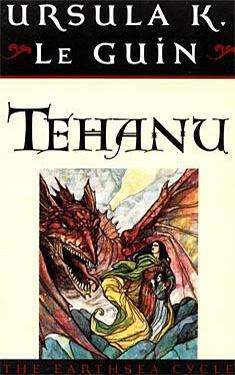Completed 11/19/2018,
Reviewed 11/20/2018
4 stars
This is the
fourth book in the Earthsea Cycle. Like
its predecessors, it has great prose but doesn’t have a lot of action. Unlike them, it’s about our heroes living
ordinary lives without their magic or power.
It was written nearly twenty years after the third book. According to LeGuin’s afterword, it took her
time and life experience to get this novel fleshed out. This really shows in how the characters weave
their ways through their lives and how they confront evil. The emotions are very realistic and the
characters very human.
 The book
follows the main character of The Tombs of Atuan, now known as Goha or by her
true name Tenar. She is now a widow with
two grown children living outside of Sparrowhawk’s home village. She runs the family farm since her son, the
inheritor of the property, is away at sea.
She has taken in a physically and emotionally abused little girl,
Therru, who has been raped and badly burned.
She finds out that Ogien, her and Sparrowhawk’s mentor, is near death,
so she goes with Therru to take care of him.
After a little while, Sparrowhawk appears, exhausted and now completely powerless
from completing his mission from The Farthest Shore. Tenar nurses him back to health. But they have one final battle against evil,
for which they must rely on outside help to get through.
The book
follows the main character of The Tombs of Atuan, now known as Goha or by her
true name Tenar. She is now a widow with
two grown children living outside of Sparrowhawk’s home village. She runs the family farm since her son, the
inheritor of the property, is away at sea.
She has taken in a physically and emotionally abused little girl,
Therru, who has been raped and badly burned.
She finds out that Ogien, her and Sparrowhawk’s mentor, is near death,
so she goes with Therru to take care of him.
After a little while, Sparrowhawk appears, exhausted and now completely powerless
from completing his mission from The Farthest Shore. Tenar nurses him back to health. But they have one final battle against evil,
for which they must rely on outside help to get through.
Once again,
there isn’t much of a plot. A lot of the
story revolves around Tenar’s life thus far, the finding and caring of Therru
and their relationship. It then evolves
into Sparrowhawk’s depression and coming to grips with no longer being a
mage. Instead of plot, there is a lot of
philosophizing on the nature and role of women in the Earthsea society,
particularly in terms of their relationship to magic. In the story, women are only witches, pale
imitations of male wizards. Tenar
questions this, not understanding why women can’t be wizards. It’s a very relevant reflection on male privilege.
The book
also has a lot to say about depression.
Sparrowhawk, once the Archmage, used up all his magic fighting the evil
at the end of the last book. He’s physically
and emotionally exhausted, and in a state of deep depression. It’s almost a PTSD-like state. Therru is in a similar state, although she’s
only a small girl. She barely speaks, shies
away from strangers, and doesn’t like to be touched. The only one who gets through to her is
Tenar, and even that is a tenuous relationship.
But when Sparrowhawk shows up, she takes to him quickly, sensing his brokenness,
even though he is not in a state to handle the company himself.
I give the
book four stars out of five. It was a
quick easy read even though the subject matter is quite difficult. Unlike the previous books, I find it is less
a YA novel, dealing with more adult themes.
This perception comes from the fact that the book is told in third
person from the perspective of Tenar rather than Therru. Many reviewers were unhappy with the lack of
magic and heroics, but I found it to be an excellent slice of life of ordinary
people and was completely content with there only being a little heroic moment
in the end.
No comments:
Post a Comment